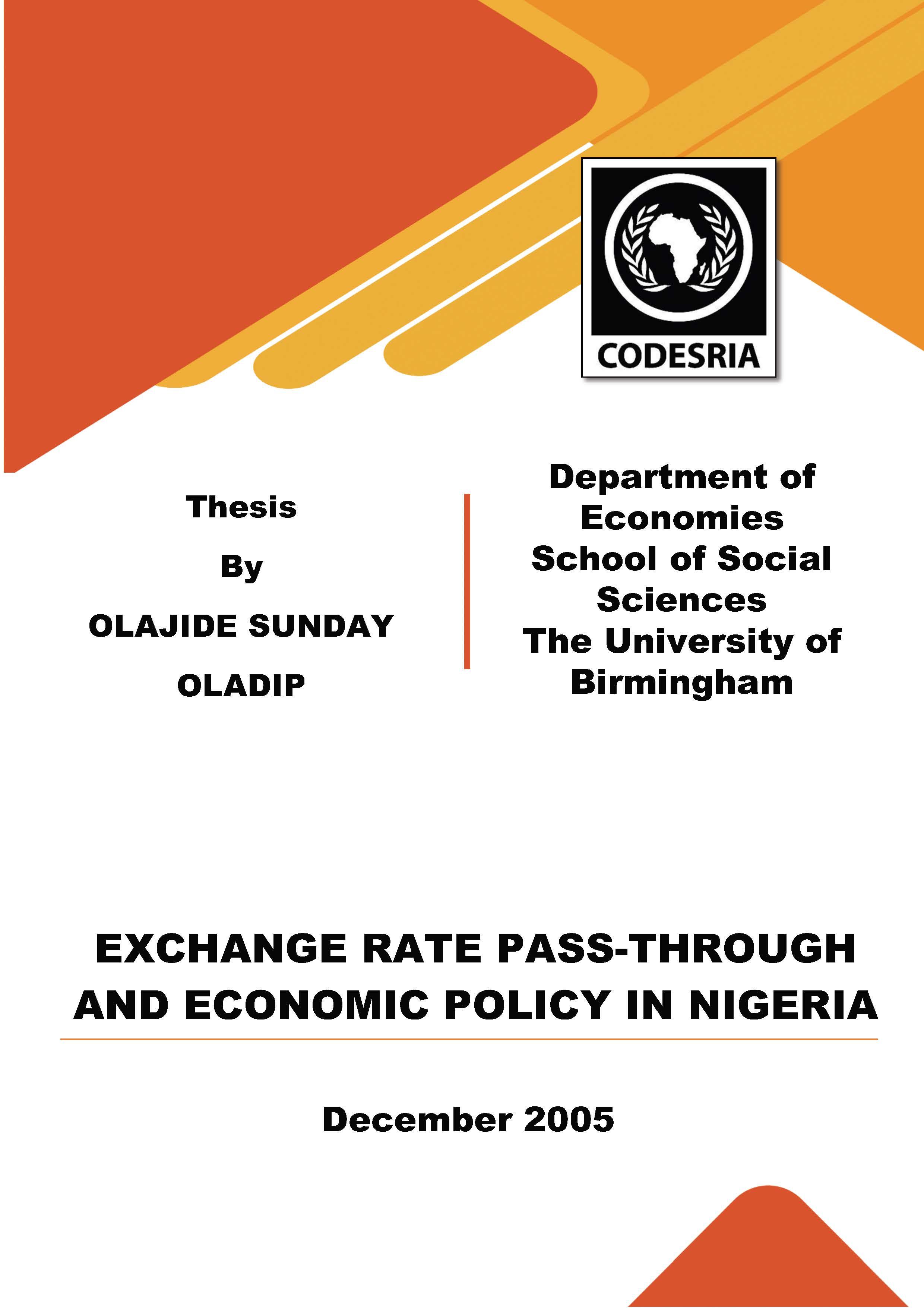EXCHANGE RATE PASS-THROUGH AND ECONOMIC POLICY IN NIGERIA
Keywords:
EXCHANGE, PASS-THROUGH, ECONOMIC POLICY, NIGERIASynopsis
This study empirically examines the degree to which fluctuations in thè exchange rate are reflected in the domestic prices of traded goods in Nigeria. Since the adoption of the International Monetary Fund (IMF) and the World Bank (WB) adjustment programme in developing countries, many developing countries, particularly Nigeria, continue to experience exchange rate volatility.
Countries around the world display great diversity in both their production and consumption of both primary and manufactured commodities. As a result, one of the most important factors affecting the ability of domestic firms to compete with foreign firms in the domestic market is the relative price of domestic and foreign - produced goods. The effect of the exchange rate on this relative price, commonly known as 'exchange rate pass-through', has · been the subject of much recent research international trade.
The resilience. of the trade balances of major trading nations in the face of wild fluctuations in exchange rates have been prominent in recent policy debates. The hypothesis of purchasing power parity (PPP), at least its loosest form, that international
trade in goods should limit the fluctuations in the relative price of tradeable goods across countries, has been a central pillar of standard open macroeconomic models for many years. The hypothesis of purchasing power parity appears to give a very good account of the fluctuations in the international relative prices of gold, oil or several other traded commodities across countries, stated in terms of a common currency, are essentially constant.
The departure from this law occurs when for a given price of a traded good, changes in domestic price are not proportional to the changes in the exchange rate. It has been argued in the literature that trade in manufactured goods are characterised by imperfect competition, therefore, pricing would no longer be at marginal cost. So, firms charge mark-up over cost to eam above normal profit. However, the mark-up charged by firms over cost depends on many factors which include the degree of substitutability between the domestic and imported goods as determined by the degree of product differentiation and the degree of market integration or segmentation (see Goldberg and Knetter, 1997)...
Downloads
References
Obaseki, J.P. (1991), Foreign Exchange Management in Nigeria; Past, Present and the Future. Economie and Financial Review. Central Bank ofNigeria Vol. 29,No.1
Obstfeld, m and Rogoff, K. (1996) Foundations of Open Macroeconomics, MIT Press.
Odedokun, M. O. (1996) An Econometric Explanation oflnflation in sub-Saharan Africa. Journal of Aji·ican Economies, 4, December.
O'Connor, R (1968) An Input-Output Analysis of the Agricultural Sector of the IrishEconomy in 1964. The Economie and Social Research lnstitute, Paper NO 45.
O'Connor, R. and E. W Henry (1975) Input-Output Analysis and its Applications. Charles Griffin and Company Ltd .
Odedokun, M.O. (1995), "An Econometric Explanation of Inflation in Sub-Saharan Africa", Journal of African Economies 4:436-51.
Ogun, 0 (1985) Devaluation and the Nigerian Economy: Sorne Observations.
The Nigerian Journal of Economie and Social Studies, Vol. 27, No. 2.
Ojameruaye, E. O. (1988) Analysis of the Determinants of General Price Level in Nigeria. Researchfor Development, 5 (January), pp 80- 96.
Ojo, O. (1974) Causes oflnflation in Nigeria. Comments on the papers' in Onitiri, H.
M. and Awosika, K. ( eds) Inflation in Nigeria, Proceedings of a National Conference, NISER, Ibadan.
Okigbo, P.N.C (l962)NigerianNationalAccounts 1950-1957. Enugu.
Olalokun, F. A; Fajana, F. O; Tomori, S; and Ukpong, I. I. (1987) Structure of Nigerian Economy. Macmillan Press.
Olukoshi, A. (1989) Impact ofIMF-World Bank Programme on Nigeria. In The IMF, the World Bank and the Aji-ican Debt, The Economie Impact, Volume 1, eds.,Bade Onimode, The Institute of African Alternatives
Olowononi, G.D. (1995) Federalism and Vertical Intergovern-mental Financial Imbalance in Nigeria, pp. 189-213, In: Fiscal Federalism and Nigeria's Economie Development. Proceedings of the 1995 NES Am1ual Conference
Onoh, C. O. (1990) The State of.the Nigerian Economy: An overv1ew. In: Structural
Adjustmen_t Programme in Nigeria: Impact of SFEM on the Nigerian Economy, Ro. Olaniyan and C. N. Nwoke, eds. Nigerian Institute of International Affairs, Lagos.






